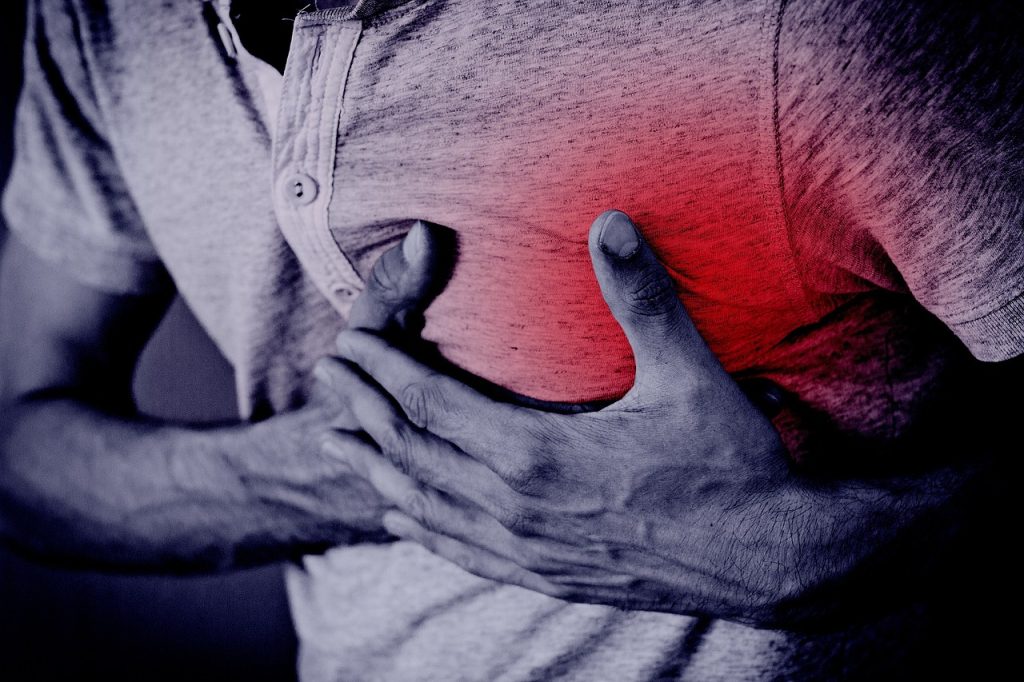Physical Health
What is relation of Jaw Pain and Heart Attack: Symptoms, Treatment
Most of us are know all about the signs of a heart attack—crushing chest pain, shortness of breath, and perhaps a cold sweat—however these side effects aren’t generally the harbingers of a cardiovascular occasion.

Most of us are know all about the signs of a heart attack—crushing chest pain, shortness of breath, and perhaps a cold sweat—however these side effects aren’t generally the harbingers of a cardiovascular occasion. In fact, new research is revealing insight into a not so much natural, but rather more uncertain, signal that could demonstrate a heart attack is impending: jaw pain.
For health enthusiasts, clinical experts, and anybody enthused about better comprehension heart health, this disclosure reclassifies listening to the body and prompts us to think about something other than the conspicuous while surveying possible cardiac issues.
In this thorough gander at the connection between jaw pain and heart attack, we’ll investigate the clarification behind this secret side effect and how it could fundamentally impact the manner in which we approach heart wellbeing.
Table of Contents
Understanding Jaw Pain
Jaw pain is not uncommon, and its origins can be fluctuated. It might be a consequence of a simple toothache, an exhausted temporomandibular joint (TMJ), or it could be the body’s approach to flagging more serious issues. Understanding the various sources of jaw pain is pivotal in recognizing when this apparently restricted uneasiness might be connected to a more profound problem, such as your heart well-being.
When dissecting jaw pain, taking into account oral health is fundamental. Dental conditions like cavities, gum disease, or infection can prompt uneasiness in the jaw region. However, the complexities of the TMJ can likewise assume a significant role. Conditions influencing the TMJ, like arthritis or injury, can cause chronic pain, sometimes copying the symptoms of a heart-related issue.
The Hidden Signal: Jaw Pain in the Face of a Heart Attack
It’s normal to experience pain in areas other than the chest during a heart failure, but the jaw is frequently ignored. The reason for this unexpected affiliation lies in the complex network of nerves in the heart and the face.
Understanding the Connections of Jaw Pain and Heart Attack
Nerves associating the heart and the jaw originate from the similar nerve group, the vagus nerve. When the heart encounters trouble, it can flag agony to the jaw, making this sign amazing as well as very deceptive. This connection accentuates one significant fact—heart health is unpredictably connected with different pieces of the body in manners we’re simply starting to disentangle.
Medical Insights
Doctors often contend that jaw pain during a cardiovascular failure can be similarly basically as extreme as chest pain and should not be excused. To get the expression—”when in doubt, check it out”—any sudden or unusual jaw pain, particularly on the off chance that it is on the left side, ought to be treated in a serious way and explored as a potential heart-related issue.
Risk Factors and Scenarios
No two heart failures are alike, and the presence of jaw pain doesn’t be guaranteed to mean a coronary episode is in progress. Understanding the risk factors and scenarios where this connection is more critical can assist people and medical care suppliers with bettering check the circumstances that require quick consideration.
Coronary Artery Disease (CAD) and Jaw Pain
One of the direct risk factors for experiencing jaw pain during a cardiovascular failure is the presence of coronary artery disease (CAD). CAD is a condition where the corridors taking care of the heart become restricted or impeded because of the gathering of greasy stores (plaque), and on the off chance that these plaques break, they can set off a respiratory failure. Patients with a background marked by CAD ought to be particularly watchful about jaw pain symptoms.
Silent Heart Attacks
A few people may experience what’s known as a silent heart failure, where symptoms are either exceptionally gentle or missing. In such cases, jaw pain might be the transcendent or sole symptom, making it basic for at-risk people to figure out this expected advance notice sign.
Signs and Symptoms
Recognizing the signs and symptoms of heart-related jaw pain is challenging, as they can be subtler and less common than the sensational chest pain frequently connected with heart failures. Portrayals fluctuate, yet patients could encounter pain that feels like an awkward strain on the jaw, frequently joined by toothache-like agony. This distress could match with practice or extraordinary feelings, filling in as an indication that your heart might struggling.
Other symptoms that, when joined with jaw pain, could recommend a heart issue include shortness of breath, nausea, and lightheadedness. It’s urgent to focus on the setting in which these side effects happen, as their timing can uncover designs that highlight a cardiac origin.
Risk Factors for Heart-Related Jaw Pain
Certain people might be more inclined to encountering jaw pain as a mark of heart problems. Normally, these people share normal risk factors for coronary disease, including a family background of cardiovascular issues, hypertension, elevated cholesterol, and diabetes, among others.
Lifestyle plays a critical role as well. The individuals who have stationary existences, smoke, or keep a less than stellar eating routine are bound to confront heart difficulties, which could appear as jaw pain. It’s fundamental to perceive the transaction of these variables and comprehend that jaw pain in these situations could act as a warning for basic heart problems.
Diagnostic and Treatment Implications
Recognizing the connection between jaw pain and cardiovascular failures has significant diagnostic and treatment suggestions that can save lives by ensuring an all the more convenient reaction to coronary episode side effects.
Diagnosis Challenges
Since jaw pain isn’t the most well-known side effect of a cardiovascular failure, it can frequently be misdiagnosed or not connected to heart health at all. This is especially unsettling for women, as they might be more inclined to encountering abnormal side effects and less inclined to remember them as indications of a heart attack.
Improved Diagnosis Protocols
New indicative conventions are being developed to include atypical symptoms and prompt more thorough investigations, for example, high level imaging and blood tests. These developing methods plan to recognize respiratory failures all the more precisely, particularly those that present with abnormal side symptoms.
Treatment Approaches
Opportune mediation is urgent in case of a coronary failure. Medicines like angioplasty, stenting, and even detour a medical procedure can be life-saving, yet their viability relies on how rapidly they are regulated. In the occasions where jaw torment is an unmistakable symptom, the key is to ensure it isn’t neglected, and legitimate demonstrative assessments are performed expeditiously.

Prevention Strategies
Prevention is always the best medicine. Assuming responsibility of your heart health through regular check-ups, maintaining a healthy lifestyle, and addressing risky behaviors can go far in forestalling heart-related issues and the possible sign of side effects, such as jaw pain. Awareness and education are essential parts of preventing heart attacks.
Understanding the signs and symptoms, especially the less commonplace ones, can urge people to make a preventive move before a wellbeing crisis happens. Implementing these strategies might save a day to day existence at any point as well as add to a better, more informed community.
Lifestyle Modifications
While a heart attack itself might require prompt clinical mediation, a large number of the risk factors that lead dependent upon it are inside our control. Lifestyle modifications are imperative in decreasing the risk of cardiovascular disease and forestalling heart attacks, regardless of jaw pain as a warning sign.
Healthy Eating and Exercise
Taking on a heart-healthy eating regimen and participating in normal active work can go quite far in keeping up with cardiovascular wellness. By keeping cholesterol and pressure in check, people can essentially decrease their gamble of creating coronary illness or encountering a heart attack.
Monitoring Body Signals
Understanding one’s own body and recognizing when something is off is a significant part of preventive wellbeing. Regular health check-ups, especially for people with realized heart risk factors, can get issues before they become extreme.
Stress Management and Quitting Smoking
Managing stress through relaxation procedures and stopping smoking are likewise fundamental in forestalling cardiovascular issues. Both are huge risk factors for heart disease and can fuel side effects like jaw torment during a cardiovascular failure.
Case Studies and Real-Life Experiences
Genuine cases give a human face to the measurements and discoveries in clinical diaries. By sharing these encounters, the clinical local area plans to bring issues to light and urge others to perceive and follow up on concerning side effects. These accounts act as a piercing wake up call that wellbeing isn’t an assurance and that remaining caution and it is fundamental to pay attention to your body.
Individual stories might incorporate people who experienced jaw pain prior to being determined to have a heart condition and how they explored their wellbeing from that point. These declarations put viewpoint on the expected seriousness of excusing apparently minor side effects and feature the significance of opportune clinical mediation.
The Future of Heart Attack Warnings
The acknowledgment of jaw pain as a potential signal of a coronary failure denotes a significant change in our discernment and familiarity with cardiovascular pain. We are seeing the development of demonstrative methodologies and general wellbeing drives that incorporate a more extensive mindfulness and reaction to abnormal heart attack symptoms.
In the future, it is conceivable that we might have wearable gadgets or home wellbeing tests that can make people aware of potential heart issues, including those that manifest with abnormal side effects like jaw pain. Up to that point, education and vigilance remain our best partners in the continuous fight against heart disease.
Understanding the nuanced associations between different real frameworks is a central stage in propelling our aggregate wellbeing. The disclosure of jaw pain as an expected indicator of heart attacks highlights the intricacy of our bodies and the interconnectedness of our health. By paying attention to these unexpected signals and taking proactive steps, we can be more ready to safeguard our most essential organ — the heart.
Conclusion of Jaw Pain and Heart Attack
The connection between jaw pain and heart attacks may be surprising, however the more we comprehend about these possible signs, the better prepared we are to answer and safeguard our heart health. By sharing detailed information, personal experiences, and featuring the significance of preventive measures, we can by and large pursue a general public that perceives and answers the unpretentious yet basic signals our bodies send us.
Remember, your health is a treasure worth safeguarding, and some of the time, the small signs like jaw uneasiness or uncommon chest sensations are the principal murmurs of a looming wellbeing challenge. Take the time to listen, respond promptly, and carry on with a day to day existence receptive to your body’s necessities and warnings.
Video: Top 10 Warning Signs Of Silent Heart Attack You Should Not Ignore
Frequently Asked Questions (FAQ)
Can jaw pain be a sign of a heart attack?
Yes, jaw pain can indeed be a sign of a heart attack. The connection lies in the complicated organization of nerves associating the heart and jaw. At the point when the heart encounters trouble, it can communicate torment signs to the jaw. This surprising side effect ought not be excused, particularly on the off chance that it happens on the left side, as it might demonstrate a heart-related issue. Looking for brief clinical consideration is vital in such cases.
What are the symptoms of a silent heart attack?
A silent heart attack may exhibit mild or no symptoms, making it challenging to detect. However, common signs include subtle discomfort, fatigue, or shortness of breath. Unlike classic heart attacks, symptoms may be less severe, and jaw pain could be the predominant or sole indicator. Regular health check-ups and awareness of risk factors are vital for identifying and addressing silent heart attacks promptly.
Are lifestyle changes effective in preventing heart attacks?
Yes, lifestyle changes assume an essential part in forestalling cardiovascular failures. Embracing a heart-sound eating regimen, participating in customary activity, and overseeing pressure can essentially diminish the gamble of cardiovascular sickness. Solid propensities assist with controlling pulse and cholesterol levels, fundamental elements in heart wellbeing. Stopping smoking and keeping an even way of life add to generally prosperity, making way of life changes a strong procedure for forestalling respiratory failures and advancing cardiovascular health.
What diagnostic tests are used to identify atypical heart attack symptoms?
Identifying atypical heart attack symptoms includes progressed indicative tests, including imaging and blood tests. Echocardiograms, CT scans, and MRIs provide detailed images of the heart, aiding in accurate diagnosis. Blood tests measure cardiovascular biomarkers, recognizing indications of heart muscle harm. These far reaching symptomatic devices assist medical care experts with surveying abnormal side effects like jaw torment, guaranteeing an exhaustive assessment and convenient mediation in instances of potential heart attacks.
Physical Health
6 Everyday Habits That Can Weaken Your Pelvic Floor Health And What to Do Instead

Your pelvic floor is a crucial but often overlooked part of your core. This group of muscles supports your bladder, bowels, and reproductive organs. When working properly, the pelvic floor plays a big role in bladder control, posture, sexual function, and even stability.
But did you know that some small, everyday habits could be silently weakening your pelvic floor over time?
Pelvic floor therapists often see patients struggling with pelvic pain, urinary leakage, or pressure—not from injury, but from things they do every day without realizing the harm.
Below are 6 common habits that can put your pelvic floor at risk—and what to do instead to keep those muscles strong and healthy.
1. Holding In Your Pee Too Long
It may seem harmless to delay a trip to the bathroom, but regularly holding your urine for extended periods can lead to an overstretched bladder and weaken your pelvic floor muscles.
What to do instead:
Use the restroom when you feel the urge—but not every time you “might” need to go. Avoid making your bladder wait too long or too often.
2. Peeing “Just in Case” All the Time
On the flip side, constantly going to the bathroom “just in case” can actually train your bladder to send early signals—even when it’s not full. Over time, this can create urgency issues.
What to do instead:
Stick to urinating every 2 to 4 hours and respond to natural cues—not out of habit or anxiety.
3. Straining During Bowel Movements
Pushing or straining during constipation increases abdominal pressure, which transfers directly onto your pelvic floor. Over time, this can cause prolapse or muscle fatigue.
What to do instead:
Support healthy bowel movements by drinking plenty of water, eating fiber-rich foods, and using a footstool to raise your knees into a squat-like position.
4. Overdoing Kegel Exercises
Yes, Kegels can help strengthen the pelvic floor—but doing them too often or without proper guidance can backfire, causing muscle tension or imbalance.
What to do instead:
Focus on both contracting and relaxing the pelvic floor. A balanced approach is key. If unsure, consult a pelvic floor physical therapist for a customized plan.
5. Sucking In Your Stomach All Day
Many people constantly “hold in” their belly to look slimmer, but doing this long-term can disrupt normal breathing and place pressure on the pelvic floor.
What to do instead:
Allow your abdomen to expand naturally when breathing. Engage your core only when needed—for example, during lifting or workouts.
6. Ignoring Pain During Sex or Exercise
Discomfort during intercourse or certain exercises might indicate pelvic floor dysfunction. Ignoring these signs could lead to more serious issues over time.
What to do instead:
Talk to your doctor or a pelvic floor specialist if you experience pain. Addressing early symptoms helps prevent long-term damage or dysfunction.
🧠 Why Pelvic Floor Health Matters
A weak or overactive pelvic floor can lead to a host of problems including:
- Urinary leakage
- Constipation
- Pelvic organ prolapse
- Lower back pain
- Pain during sex
Maintaining good habits, listening to your body, and getting professional help when needed can make a huge difference in your core and overall well-being.
✅ Final Thoughts
Most of us don’t think twice about our pelvic floor until something goes wrong. But by avoiding these six everyday habits—and replacing them with smarter strategies—you can keep your pelvic floor strong, balanced, and healthy.
If you’re experiencing ongoing pelvic issues, don’t hesitate to seek guidance from a pelvic floor therapist. They can assess your needs and build a recovery plan that’s specific to your body.
📌 Related Posts
- 6 Quick Morning Exercises to Burn Belly Fat All Day
- How to Boost Immunity Naturally: 10 Tips to Execute This
Understanding Pelvic Floor Conditions from Youtube
Physical Health
Isometric Exercises: A Proven Method to Lower Blood Pressure Naturally

High blood pressure, or hypertension, affects millions worldwide and is a leading risk factor for heart disease and stroke. While medications are commonly prescribed, recent studies highlight the significant impact of isometric exercises in naturally reducing blood pressure levels.
🧠 What Are Isometric Exercises?
Isometric exercises involve muscle contractions without joint movement. Unlike dynamic exercises, these workouts require holding a static position, engaging muscles continuously. Common examples include:
- Wall sits: Sitting against a wall with knees at a 90-degree angle.
- Planks: Holding the body in a straight line, supported by forearms and toes.
- Static lunges: Holding a lunge position without movement.
- Isometric handgrip exercises: Squeezing a device or object without changing hand position.
📊 Scientific Evidence Supporting Isometric Exercises
A comprehensive review published in the British Journal of Sports Medicine analyzed data from 270 randomized controlled trials involving over 15,000 participants. The findings revealed that:
- Isometric exercises led to an average reduction of 8.24 mm Hg in systolic and 4.00 mm Hg in diastolic blood pressure.
- These reductions were more significant compared to those achieved through aerobic, dynamic resistance, or high-intensity interval training (HIIT) exercises.
“Isometric exercises, such as wall sits and planks, are highly effective in lowering blood pressure and should be considered as a primary exercise modality for managing hypertension.” — British Journal of Sports Medicine
💪 Seated Isometric Exercises You Can Do at Home
✋ 1. Hand Grip Squeeze
This simple exercise can be done with a hand gripper, stress ball, or even a tennis ball — anything that provides resistance when squeezed.
🗣️ “Hold each squeeze for about 2 minutes per hand, then rest for 1 to 4 minutes before repeating,” recommends Ben Kelly, a cardiac health expert.
How to do it:
- Sit upright in a chair.
- Grip your resistance object tightly.
- Squeeze and hold for 2 minutes.
- Repeat 4 times per hand.
Muscles worked: Forearms, wrists, and hand flexors.
🏋️♀️ 2. Static Bicep Curl (Seated or Standing)
You can perform this movement while sitting or standing. Use light dumbbells, water bottles, or any object with weight.
How to do it:
- Hold a weight in each hand.
- Keep your elbows close to your sides.
- Bend your arms at 90 degrees, palms facing upward.
- Hold the position for 30–60 seconds.
Muscles worked: Biceps, forearms, and shoulders.
🦸 3. Superman Hold (Lying Position)
Although not technically seated, the Superman hold is a floor-based isometric exercise that doesn’t require standing — and it’s great for your core and back.
How to do it:
- Lie face down on a yoga mat or bed.
- Extend your arms forward and legs back.
- Simultaneously lift your chest, arms, and legs off the floor.
- Hold this flying pose for 30–45 seconds.
Muscles worked: Lower back, glutes, shoulders, and abdominals.
🚶 Standing Isometric Exercises for Lowering Blood Pressure
🧱 4. Wall Sit
The wall sit is a classic isometric move that challenges the lower body and has been shown to significantly reduce blood pressure when practiced regularly.
How to do it:
- Stand with your back against a flat wall.
- Slide down until your knees are at a 90° angle.
- Keep your back flat against the wall, and thighs parallel to the ground.
- Hold for up to 60 seconds without moving.
Advanced tip: Alternate lifting one foot at a time to increase intensity.
Muscles worked: Quadriceps, hamstrings, glutes.
🧘♀️ 5. Glute Bridge Hold
This back-lying exercise focuses on your posterior chain and strengthens your hips and core, while engaging stabilizer muscles that support the spine.
How to do it:
- Lie on your back with knees bent, feet flat on the ground.
- Press through your heels to lift your hips.
- Keep your body in a straight line from shoulders to knees.
- Hold the bridge for 30–60 seconds.
Advanced tip: Place a weight on your hips for increased resistance.
Muscles worked: Glutes, hamstrings, lower back, core.
🧪 Isometric Exercises vs. Other Workouts for Blood Pressure
A landmark systematic review analyzed over 270 clinical trials and compared five main categories of exercise for their impact on resting blood pressure:
Exercise Type Average Effectiveness ✅ Isometric Exercise Most effective ✅ Combined Training (Cardio + Weights) Highly effective ✅ Resistance Training Effective ✅ Aerobic Exercise Moderately effective ✅ HIIT (High-Intensity Intervals) Effective but variable
📊 Isometric exercises came out on top, outperforming cardio, HIIT, and resistance workouts when it came to lowering both systolic and diastolic blood pressure.
This means that even short, static holds — when performed consistently — may provide greater benefits than a 30-minute jog.
🏋️♀️ How Do Isometric Exercises Lower Blood Pressure?
The mechanisms by which isometric exercises reduce blood pressure include:
- Improved vascular function: Enhancing the elasticity of blood vessels, leading to better blood flow.
- Reduced arterial stiffness: Decreasing resistance in the arteries, facilitating easier blood circulation.
- Enhanced autonomic regulation: Balancing the nervous system’s control over heart rate and blood pressure.

🕒 Incorporating Isometric Exercises into Your Routine
To effectively lower blood pressure through isometric exercises:
- Frequency: Aim for 3 sessions per week.
- Duration: Each session should include 4 sets of 2-minute holds, with 1-2 minutes of rest between sets.
- Progression: Gradually increase the duration and intensity as your strength improves.
Sample Routine:
- Wall Sit: 2 minutes hold
- Rest: 2 minutes
- Plank: 2 minutes hold
- Rest: 2 minutes
- Repeat the cycle
Note: Always consult with a healthcare professional before starting any new exercise regimen, especially if you have existing health conditions.
🧘♂️ Additional Benefits of Isometric Exercises
Beyond lowering blood pressure, isometric exercises offer:
- Improved muscular strength and endurance
- Enhanced core stability
- Better posture and balance
- Convenience: No equipment needed and can be performed anywhere
🏃 Can Other Exercises Help Lower Blood Pressure?
Yes! The NHS and other health organizations continue to recommend aerobic exercises like brisk walking, cycling, or swimming as part of a well-rounded plan for managing hypertension.
NHS Activity Guidelines:
- 150 minutes per week of moderate-intensity aerobic activity
- Spread across 4–5 days
- Combine with strength training for added benefit
However, adding isometric exercises like wall sits or handgrip squeezes can provide an additional layer of protection, especially for those unable to engage in high-impact or extended workouts.
📝 Final Thoughts
Incorporating isometric exercises into your fitness routine is a simple yet effective strategy to manage and reduce high blood pressure. With consistent practice, these exercises can lead to significant health improvements, complementing other lifestyle modifications.
📌 Related Articles
- The Power of HIIT Workout: Ultimate Efficiency and Fitness Transformation
- Benefits of Outdoor Exercise: Fit with Nature
- Best Yoga for Strength and Flexibility: Full Body Practice at Home
Ready to take control of your blood pressure? Start incorporating isometric exercises today and experience the benefits firsthand.
Physical Health
What Is a Stroke? Types, Symptoms, Causes, Risk Factors, Treatment & Prevention

A stroke is a medical emergency that occurs when the blood supply to a part of the brain is suddenly interrupted or severely reduced. Without oxygen-rich blood, brain cells begin to die within minutes — making stroke one of the leading causes of death and long-term disability worldwide.
Understanding what a stroke is, the different types, early warning signs, causes, and preventive strategies can save lives — including your own.
🧠 What Exactly Is a Stroke?
A stroke happens when blood flow to a part of your brain is cut off, either due to a blockage (like a clot) or a ruptured blood vessel. This disruption prevents oxygen and nutrients from reaching brain tissue, causing cells to die rapidly.
Every second counts. Quick treatment minimizes brain damage and increases the chances of recovery.
⚠️ Common Symptoms of a Stroke (FAST Warning Signs)
The acronym F.A.S.T. can help you recognize the signs of a stroke quickly:
- F – Face drooping: One side of the face looks uneven or numb
- A – Arm weakness: Inability to lift both arms evenly
- S – Speech difficulty: Slurred speech or trouble speaking clearly
- T – Time to call emergency services: Immediate medical attention is critical
Other symptoms may include:
- Sudden numbness or weakness (especially on one side of the body)
- Confusion or trouble understanding speech
- Difficulty seeing in one or both eyes
- Dizziness, loss of balance, or coordination issues
- Severe headache with no known cause
Don’t wait. Stroke is a time-sensitive emergency. The faster the response, the better the outcome.
🔍 Types of Stroke You Should Know
Understanding the different types of stroke is essential for proper diagnosis and treatment:
🧩 1. Ischemic Stroke
- Cause: Blocked artery (blood clot or narrowed blood vessel)
- Frequency: Most common type (approximately 87% of all strokes)
- Examples: Thrombotic stroke (clot forms in the brain), embolic stroke (clot travels from another part of the body)
💥 2. Hemorrhagic Stroke
- Cause: Ruptured blood vessel causing bleeding in the brain
- Risk Factors: High blood pressure, aneurysms, trauma
- Types: Intracerebral hemorrhage (within brain tissue) and subarachnoid hemorrhage (bleeding between brain and surrounding tissues)
⚠️ 3. Transient Ischemic Attack (TIA)
- Often called a “mini-stroke”
- Temporary blockage with no permanent damage
- Warning sign: A major stroke could follow — take it seriously
🧬 What Causes a Stroke?
Stroke can result from several factors and underlying conditions, including:
- High blood pressure (Hypertension) – #1 cause of strokes
- Atherosclerosis – Plaque buildup in arteries
- Blood clots or heart conditions (like atrial fibrillation)
- Brain aneurysms or arteriovenous malformations (AVMs)
- High cholesterol and diabetes
- Head injuries (in hemorrhagic stroke cases)
🔎 Key Risk Factors for Stroke
While some risk factors are beyond your control, many are modifiable with lifestyle changes.
🧓 Non-Modifiable Risk Factors:
- Age (risk increases after 55)
- Gender (men have a higher risk, but women are more likely to die from stroke)
- Family history of stroke
- Prior stroke or TIA
🏃♂️ Modifiable Risk Factors:
- High blood pressure
- Smoking and alcohol use
- Poor diet (especially high in salt and sugar)
- Physical inactivity
- Obesity
- Diabetes
- High cholesterol
- Stress and unmanaged mental health
🧪 How Stroke Is Diagnosed
If a stroke is suspected, medical professionals will perform a combination of:
- Neurological exams
- Brain imaging (CT scan or MRI)
- Blood tests
- Electrocardiogram (EKG) to check for heart conditions
- Carotid ultrasound or angiography to examine blood flow
Early diagnosis can determine the type of stroke and guide treatment decisions.
💉 Stroke Treatment: Time Is Brain
🧊 Emergency Treatment for Ischemic Stroke:
- Clot-busting drugs (tPA): Must be administered within 3–4.5 hours of symptom onset
- Mechanical thrombectomy: Removing the clot manually (for large clots)
🩸 Emergency Treatment for Hemorrhagic Stroke:
- Blood pressure control
- Surgical repair of blood vessels
- Draining accumulated blood to relieve pressure on the brain
🧠 Post-Stroke Recovery:
- Physical therapy
- Occupational therapy
- Speech therapy
- Psychological counseling for mental and emotional support
🛡️ How to Prevent a Stroke
Fortunately, up to 80% of strokes are preventable with proactive lifestyle changes and medical management.
✅ Prevention Tips:
- Keep blood pressure under control (target: <120/80 mm Hg)
- Quit smoking immediately
- Limit alcohol and processed foods
- Exercise regularly (at least 30 minutes, 5x/week)
- Manage diabetes and cholesterol
- Eat a brain-friendly diet: Leafy greens, berries, omega-3s
- Stay mentally and emotionally balanced (chronic stress increases stroke risk)
🧠 “Prevention is the most powerful treatment,” says Dr. Linda Meyer, stroke specialist.
📊 Stroke Quick Facts
| Category | Statistic |
|---|---|
| Leading cause of death | #5 in the U.S. |
| Every year | ~800,000 people suffer a stroke |
| Most common type | Ischemic (87%) |
| Women vs. Men | Women more likely to die from stroke |
| Preventability | 80% of strokes are preventable |
🧠 Final Thoughts: Know the Signs. Protect Your Brain.
A stroke can change your life in seconds — but awareness and quick action can change the outcome. Whether you’re caring for aging parents, managing your own health, or simply want to stay informed, knowing what a stroke is and how to prevent it is essential.
Act FAST. Live smart. And never ignore the signs.
More about stroke from YouTube channel Mass General Brigham
-

 Personal Care8 months ago
Personal Care8 months agoWhy Regular Massages Could Be the Game-Changer Your Body and Mind Crave
-

 Mental Health7 months ago
Mental Health7 months agoHow to Overcome Phobias: 15 Positive Psychology-Based Strategies That Really Work
-

 Lifestyle7 months ago
Lifestyle7 months agoWhen Is It Time To Get a Divorce? Emotional, Mental & Practical Signs to Know
-

 Fitness7 months ago
Fitness7 months ago6 Quick Morning Exercises to Burn Belly Fat All Day
-

 Mental Health7 months ago
Mental Health7 months agoWhat Is A Depression Attack? Symptoms, Causes & How To Cope With One
-

 Lifestyle7 months ago
Lifestyle7 months agoHow to Improve Egg Quality for Fertility: Science, Lifestyle and Expert Tips
-

 Food7 months ago
Food7 months agoHealthy Rice Varieties: Nutrition and Health Benefits
-

 Personal Care7 months ago
Personal Care7 months agoHow to Reparent Your Inner Child: Healing and Self-Compassion


